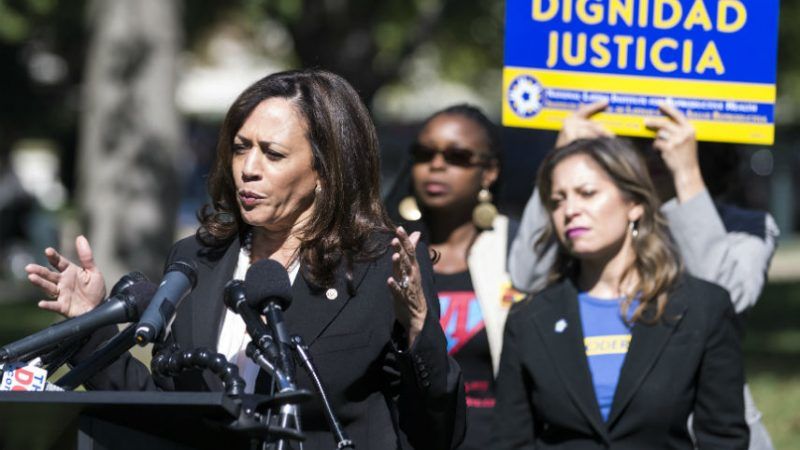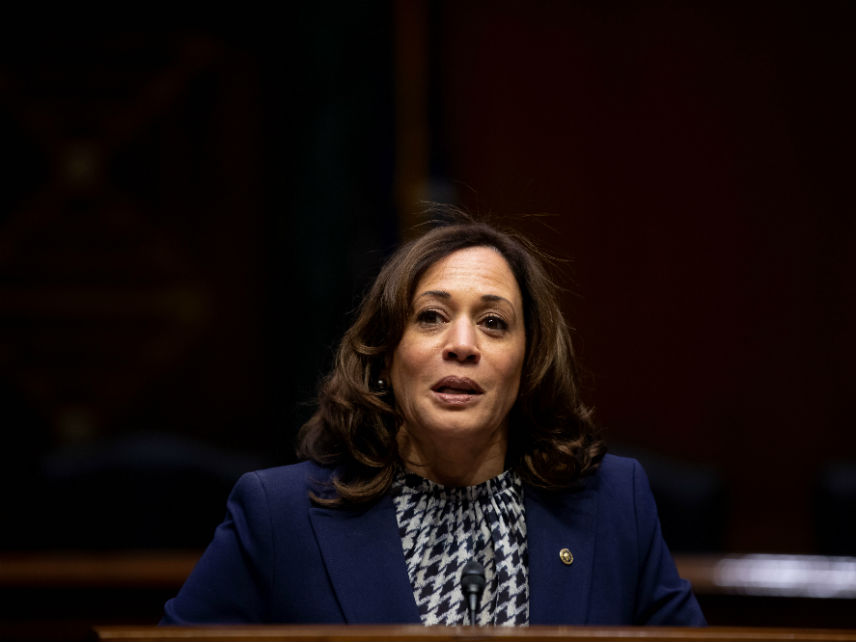Kamala Harris Went to Bat for Dirty Prosecutors as California Attorney General
The newest member of the Senate Judiciary Committee has a record on criminal justice. Some of it's not pretty.


Scroll through the carefully manicured Twitter account of Sen. Kamala Harris, a rising star in the Democratic Party and one of the newest members of the powerful Senate Judiciary Committee, and you'll find many references to "justice."
Harris is one of the strongest voices in the Senate for criminal justice reform and rolling back the drug war. However, during Harris' time as a prosecutor and eventually California attorney general, her offices repeatedly tried to tip the scales of justice in favor of prosecutors.
Such tactics aren't unusual among state prosecutors, unfortunately, but they are revealing.
When a judge removed the entire Orange County District Attorney's Office from a death penalty trial in 2015—after it was revealed in a bombshell memo that the sheriff's department had been running an unconstitutional jailhouse informant program—Harris' office appealed the removal.
"The Attorney General believes the findings of the court regarding the discovery violations in this case are serious and demand further investigation," the California A.G.'s office said in a statement. "But, as the court found, 'there is no direct evidence that the District Attorney actively participated in the concealment of this information from the defense and the court.'"
In 2015, the California Attorney General did announce it was conducting an investigation into the affair, but that report has yet to be released. In the meantime, the jailhouse snitch scandal has tainted more than a dozen criminal cases, including several murder trials.
Harris' record as San Francisco D.A. has similar instances. In 2010, a California superior court judge excoriated Harris' office for failing to notify defense lawyers of known misconduct by a drug lab technician that later led the San Francisco police to shut down an entire section of the lab.
The judge wrote that an internal office memo showed that prosecutors "at the highest levels of the district attorney's office knew that Madden was not a dependable witness at trial and that there were serious concerns regarding the crime lab."
The judge wrote that Harris' office had some "duty to implement some type of procedure to secure and produce information relevant to Madden's criminal history." However, the judge's requests that prosecutors explain why nothing happened were met with "a level of indifference."
As California Attorney General, Harris' office continued to display indifference toward concerns of misconduct. In March 2015, the California A.G. appealed the dismissal of a child molestation case after a Kern County prosecutor falsified an interview transcript to add an incriminating confession.
Harris' office, citing state court precedent, tried to argue that the prosecutor's action "was certainly conscience shocking in the sense that it involved false testimony by a prosecutor in a formal criminal proceeding. But it did not involve 'brutal and … offensive' conduct employed to obtain a conviction." In other words, the defendant's false confession wasn't beaten out of him, and therefore didn't violate his constitutional rights. The judge disagreed and threw out the conviction.
In another 2015 case, Baca v. Adams, Harris' office opposed a post-conviction appeal by a defendant who was sentenced after the prosecutor in his case lied to the jury about whether an informant received compensation for his testimony. A state court found the prosecutor's testimony was "sheer fantasy," but declined to overturn the conviction.
The former chief judge of the 9th Circuit, Alex Kozinski, an outspoken critic of prosecutorial misconduct (himself now retired amid sexual harassment allegations), proceeded to rhetorically flay the deputy attorney general who had the unfortunate job of defending the A.G.'s position that the prosecutor had not lied. Kozinski asked why unethical prosecutors weren't being charged with perjury or disciplined at all for their misconduct.
"[Harris], or someone in her office, could prosecute these cases if she thought this was a serious matter that was not being handled by the local authorities," Kozinski said. "Has that happened? Has an investigation been done? Have any steps been taken to show that California does not condone prosecutors getting on the stand and lying to the jury in a criminal case?"
"In this case… I guess, my answer is, I suppose, other than the criticism from the court of appeal, the answer to that is no," the deputy attorney general responded.
Kozinski threatened that "it would look terrible in an opinion when we write it up and name names." After the video of the hearing—the courtroom equivalent of a snuff film—went viral in law circles, the California A.G.'s office filed a motion dropping its opposition, "in the interest of justice." Harris had announced she was running for the U.S. Senate about two weeks earlier, and she was, after all, very concerned about justice.
